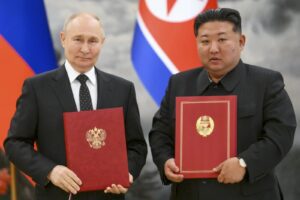ButSpeak.com
News which Matters.

In a significant diplomatic move, Russian President Vladimir Putin and North Korean leader Kim Jong Un have signed a new partnership agreement, vowing mutual aid if either nation is attacked. This pact comes as both countries face escalating tensions with the West.
The landmark deal, which spans security, trade, investment, and cultural ties, marks the strongest bond between Moscow and Pyongyang since the Soviet Union‘s collapse in 1991. Both leaders hailed the agreement as a substantial upgrade in their bilateral relationship.
Putin’s visit to North Korea, his first in 24 years, comes amid growing concerns from the U.S. and its allies about a potential arms arrangement. Reports suggest North Korea may provide Russia with munitions for its ongoing conflict in Ukraine, in exchange for economic assistance and technological support to bolster Kim’s nuclear program.
Kim described the agreement as the “strongest ever treaty” between the two nations, emphasizing full support for Russia’s actions in Ukraine. Putin called it a “breakthrough document,” reflecting a shared desire to elevate their relationship.
The summit featured a grand welcome for Putin, who was greeted by Kim at the airport and escorted through Pyongyang in a lavish motorcade. Thousands of North Koreans lined the streets, waving flags and chanting greetings as Putin arrived.
During the talks, Putin expressed gratitude for North Korea’s support in Ukraine, framing it as part of a broader struggle against U.S. hegemony. He traced the historical ties between the two nations back to Soviet support during the Korean War. Kim reciprocated by promising “full support and solidarity” with Russia’s military operations in Ukraine.
The exact nature of North Korea’s support remains unclear, but Kim’s rhetoric consistently positions Pyongyang as an ally against what he sees as Western aggression. Both nations face heavy international sanctions—North Korea for its weapons program and Russia for its actions in Ukraine.
U.S. and South Korean officials have accused North Korea of supplying Russia with military equipment, a claim both Pyongyang and Moscow deny. Such actions would violate U.N. Security Council sanctions that Russia previously endorsed.
In March, Russia’s veto at the U.N. ended the monitoring of sanctions against North Korea, raising suspicions that Moscow is seeking to avoid scrutiny over potential weapons transfers. Putin’s foreign affairs adviser, Yuri Ushakov, mentioned that gifts were exchanged, including a Russian-made limo for Kim and artworks for Putin.
The partnership also includes plans for a road bridge on their shared border and cooperation in healthcare, education, and science. Kim characterized the agreement as peaceful and defensive, expressing hope for a multipolar world.
In Washington, U.S. Secretary of State Antony Blinken remarked that Putin’s visit to North Korea highlights Russia’s desperation to sustain its war efforts in Ukraine. Analysts suggest the partnership may also involve illicit activities, such as increased labor exports from North Korea to Russia, to evade sanctions.
The geopolitical climate remains tense, with frequent weapons tests by North Korea and joint military exercises by the U.S., South Korea, and Japan. This new alliance between Russia and North Korea adds another layer of complexity to an already volatile international scene.